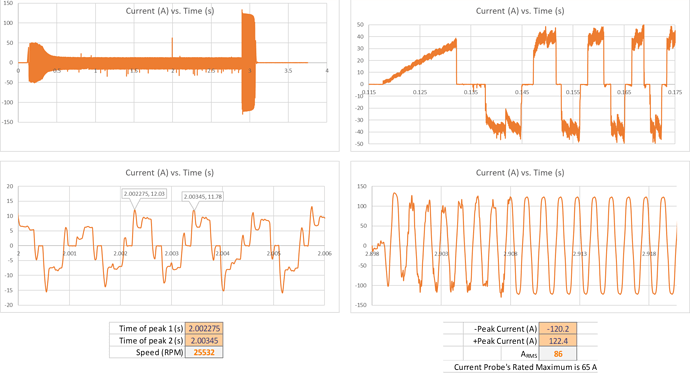Is it stalled? Sometimes motors looking for sensor feedback can cog and get stuck between motor poles.
Hmm. I do not think that is the issue, but I think I might try running it sensorless to see if that might be part of it.
Mad Scientist Moment:
Good news is I got the motor working with the VESC using PPM. The hall sensors were the issue. Running it sensorless and it started right up. Bad news is while trying to figure out why it wasnt able to use the sensors magic smoke came out of my powersupply. Didnt even blow the fuse. Before my PS died it looks like the VESC tried to push 160amps into the motor. I think I am just going to run it sensorless. LOL
Awesome work!
What power supply were you running?
A Mean Well 24V 14.6A supply. Pretty good quality. Already have an exchange on its way as well as an inline fuse. Hopefully that will help.
Indeed, normally a decent supply. They have short circuit output protection too so it shouldn’t have failed on over-current.
Does the VESC do active braking of the spindle? If so then you might want to turn that off or put some sort of crowbar / shunt circuit in to prevent overvolt-ing the PSU during spin down.
It can do active breaking but it SHOULD have been disabled. Not sure how many people disable it with the VESCs because they are mostly used on small electric vehicles (bikes, skateboards, scooters, etc) so no clue if it was actually working.
Here’s what one of the motor winding currents look like when my unloaded 18V Milwaukee BLDC router starts, runs, and stops. I imagine that the battery absorbs much of that braking energy (which needs to go somewhere). A diode in series with the VESC’s input power line would probably save the power supply, but might break the VESC - especially if it’s not rated for twice the motor’s operating voltage. So a big voltage clamp of some type (near the VESC) is probably the way to go.
Nice data.
Yes, a power sink of some sort is what’s needed for active braking, things like the VESC are likely to do this both for tool safety where fast stops are required and for battery life through regen braking on one-wheels and things like that.
As you say though in most cases that’s the battery, because thats the design intent and they can sink a lot of power for short periods. On a bench supply it gets more complicated as you need to put some power dissipating components in with those over-voltage triggers.
The sensorless motor config I’ve been running has everything enabled and it hasn’t been an issue running the VESC tool manual controls. I have been able to get the vesc to throw an over voltage fault but didn’t fry anything.
You can set the speed controller to not allow braking, brake max current to zero, battery regen max current to zero.
Yup and at which point it is supposed to coast instead of break.
I have been debating saying screw the VESC and go with an ODRIVE:
They have a breaking resistor and a VERY active development including UART control.
And… You can publish really good and technical videos in a German accent.
Which hardware are you using for VESC? The open source board or one of the newer commercial ones?
I’ve been considering driving the stock Nomad spindle with VESC…
I am using this guy:
https://www.amazon.com/gp/product/B07VL7D1WC
This British guy uses them in most of his builds these days:
That’s a hell of a lot cheaper than the VESC6. Very tempting to try to replace the McGillicutty now…
Well seeing how I blew a powersupply experimenting with this. I would say hold off till I have something working. LOL
Just bought an ODrive to test with.
